When you were a kid, you probably thought the adults in your life had it made. After all, adults have money, power and the option to eat ice cream for breakfast if they want to, right? But when it comes to picking up an instrument, the irony here is that children often have it much easier than adults most of the time. How do I know this? Because I’ve taught thousands of students of all ages how to play the guitar, and it’s a pattern I’ve noticed over the years. But despite being busy, many adults I’ve taught manage to thrive and get the most out of learning guitar. In this article, I’ll share 10 great tips aimed at helping adults who want to pick up the guitar and stick with it. Whether you’ve been trying to play for years or have just recently picked up the instrument, the information in this article will be helpful for you.
Tip #1: Be realistic about your time commitments going in
 My first tip is a hugely important one. Many of the adult students I’ve met fall short of their goals because they weren’t realistic about how much time they’d be able to commit to practicing or even just playing for fun. The only way you’ll be able to learn how to play the guitar is if you take the time to sit down and play it, and this will take a serious commitment on your part.
My first tip is a hugely important one. Many of the adult students I’ve met fall short of their goals because they weren’t realistic about how much time they’d be able to commit to practicing or even just playing for fun. The only way you’ll be able to learn how to play the guitar is if you take the time to sit down and play it, and this will take a serious commitment on your part.
If you’re serious about learning guitar, then take some time to sit down and create a schedule of your weekly commitments. How much time do you realistically have for practicing after you account for work, parenting and your other time commitments? If you can, try to carve out three half-hour slots in your schedule dedicated to practicing. Don’t have enough time for that? That’s totally okay, but your progress will be slower compared to someone who can find more time to practice.
The trick here is to be as realistic as possible about how much time and energy you’re able to give your guitar practice. I’ve met a lot of adults who’ve wanted to play the guitar for years who end up taking lessons for a month and then bam, that thing called “life” gets in the way and they end up quitting. Knowing your limitations going in can help you stick to some sort of schedule and continue to make progress.
Tip #2: Define your goals in learning the guitar
Knowing what exactly you’d like to accomplish by learning the guitar will help you make strides on the instrument in huge, noticeable ways. Want to write your own music? How about practicing singing and playing some old country songs that you eventually want to play on stage for the first time? Or maybe you’ve always wanted to learn how to play blues guitar like B.B. King. Defining and setting goals is essential because they’ll give your practice more direction, meaning and urgency.
With guitar, everyone begins in the same exact place. You start by learning how to press your fingers down on the strings in a way that produces pitches. Then you master basic open chords, scales and begin developing muscle memory in your hands. But after you’ve mastered basic technique on the guitar, what you do will drastically change depending on the types of goals you’ve set for yourself.
If you’re not entirely sure what you want to get out of learning the guitar, that’s completely normal. The act of defining your goals is a process that will get you thinking about who you are in relation the music and what you truly want to get out of learning guitar.
Tip #3: Create a space in your home dedicated to practicing guitar
Whether you live in a mansion or a studio apartment, dedicating a spot in your home for guitar playing will do huge things for your practice. This is because as adults, we realistically don’t get things done unless we dedicate the space for it in our lives.
Are you a parent with young children? Then creating a kid-free space in your home will give you the best chance at being able to focus on learning guitar. If you’re living in a house with roommates then the same sort of idea applies here. And if all else fails, consider bringing your guitar to your office to practice during your lunch hour or even renting out a small studio space in town.
But creating a space for learning guitar isn’t always just physical. Going back to the parenting example, a parent with young children wanting to learn how to play the guitar will have to hand the kids off to their partner or a sitter when they practice the guitar. If you’re especially career-oriented, you might have to miss drinks with coworkers or meetings here and there to find time to practice. Learning guitar as an adult takes effort, planning and some sacrifices every now and again.

Tip #4: Hold yourself accountable
The biggest advantage kids have over adults who want to learn how to play the guitar is that kids usually have their parents making sure they’re practicing and making progress towards their goals. As adults, we have no one keeping us accountable other than ourselves, and this can be tricky for some folks. Why?
Because as adults, we have tons of excuses not to practice the guitar at any given time. Work, relationships, parenting, you name it. Being the boss of your own life comes attached with a seemingly endless amount of commitments, appointments, bills and other tedious concerns. This means that if you want to take up something extra, like working out or learning guitar, you’re gonna have to fight for the time and space to make it happen.
You can absolutely succeed in learning how to play this incredible instrument, but not without planning and accountability. In addition to creating goals and sticking to a schedule, try checking in with yourself every week to see if you’re making progress.
Tip #5: Don’t get discouraged when you can’t find time for practicing
Even people who stick to strict practicing schedules will ultimately not be able to practice as much as they want. Taking an all or nothing approach when it comes to learning guitar will set you on a path toward getting discouraged and eventually quitting. Adults who succeed in learning guitar for the first time are able to find a good balance between being serious about their goals but also for leaving plenty of room for life and all its complications.
When your life gets hectic and you can’t find time to play, just get back to playing as soon as you can. You’ll probably find that at certain times of the year, like during the holiday season, life is just too hectic for practicing guitar. Again, this is completely normal, but the trick is getting back to a set practice schedule whenever you can.
Tip #6: Make sure you’re having fun
 You probably won’t get very far on the guitar unless you’re able to have fun while you’re playing. Adults sometimes have a way of taking the fun out of things, and this can be a detriment to learning new skills and doing things that can truly enrich our lives. If you’re too wrapped up in the routine of practicing, it might be time to rethink what you’re doing to learn the guitar.
You probably won’t get very far on the guitar unless you’re able to have fun while you’re playing. Adults sometimes have a way of taking the fun out of things, and this can be a detriment to learning new skills and doing things that can truly enrich our lives. If you’re too wrapped up in the routine of practicing, it might be time to rethink what you’re doing to learn the guitar.
Taking some time to play your guitar just for fun is a good way to keep things fresh and interesting. If you’re not really sure what to play or how to get started, I recommend improvising over the 12-bar blues progression. In case you’re not familiar, the 12-bar blues progression is a song form developed in the American blues tradition that’s now found in every style of music from rock and roll to jazz. Try recording this simple chord progression onto your smartphone or computer and improvising over it using notes from this blues scale. You can play this with any tempo and strumming pattern you want. Even if you have no interest in the blues, this exercise should be fun and helpful for you.

Tip #7: Recognize and celebrate your progress
If you’re able to recognize and celebrate the large and small victories in your playing, you’ll have a much better chance at mastering the guitar compared to someone who is never satisfied with their playing. Learning the guitar for the first time is hard. Really hard. And there’s nothing wrong with admitting that.
Every bit of progress you make is important, and you’ll need to learn how to get excited enough about the small stuff to get you through the challenge of learning guitar for the first time. Whenever you get discouraged, try stepping back and recognizing how far you’ve come whether you’re barely able to press down the strings or are able to play virtuosic riffs and solos.
Tip #8: Don’t be an island
The parents of guitar students often spend loads of money to enroll their kids in group lessons or band programs, and this is for a good reason. Kids who learn music in group settings are able to learn from their more experienced peers and have fun at the same time. The same goes for adults. If you’re serious about learning guitar, make an effort to get involved with a band, open jam session or any other group setting that pairs you up with other musicians.

Adults sometimes have a way of living narrow lives that are closed to the outside world because we work the same jobs and are exposed to the same people for years or even decades at a time. Being around other musicians or even just adults who are learning guitar just like you will help expose you to new ideas and can keep you encouraged and on the right path. Communities of even just a few like-minded individuals have a way of accomplishing things that just one person could never do, so don’t be an island when it comes to learning how to play the guitar.
Tip #9: Make practicing the guitar a pressure-free zone
Again, adults who succeed in learning how to play guitar are able to balance their serious desire to want to learn with making playing the guitar a fun and rewarding experience. If you approach your guitar playing like you do your career, then you’re going to have a difficult time. I once taught a really nice guy who happened to be a surgeon. He had an incredibly difficult time playing because he wasn’t able to calm down, relax and get comfortable with making mistakes. He never said so, but I believe he had an especially hard time because he put a similar pressure into his guitar practice that he did in his profession. After a few lessons, he got discouraged and quit.
With learning any new instrument, mistakes are inevitable and are actually really important opportunities for growth. There is no perfect way to learn this instrument, and adding unneeded stress and pressure will thwart your best efforts in playing guitar.
Tip #10: Work with a patient, experienced teacher in your area
Finding a great guitar teacher in your area to work with is your best bet at succeeding in learning guitar. In 2017, there’s more free resources than ever aimed at helping people of all ages learn how to play, but nothing can replace the expertise, patience and guidance that the right guitar teacher can give you.
Even if you live in a small city, there will probably be a few different teachers for you to choose from, and many instructors are willing to travel to your home for lessons. When looking for a teacher to work with, keep in mind that you could end up working with someone for years, so things like playing style, attitude and demeanor are hugely important.
Learning guitar as an adult can be difficult, but it’s a massively rewarding experience that has the power to alter lives for the better. Like anything else in life, if you want it badly enough, you’ll make it happen for yourself with the right amount of practice and effort. For more helpful articles about the world of music, check out the Musika Lessons blog.







